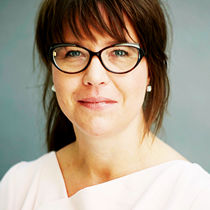It doesn’t matter how well you know the work and writing of Prof Elisabeth Staksrud, she can always surprise you with a new angle, an interesting explanation, or an aspect that you have not previously considered. I am reminded of this right at the beginning of the conversation when Elisabeth compares media study scholars to magpies:
One of the things that I love about media studies is that it’s a young field. So when it comes to theory, we get to be the ‘magpie’ of the academic world. We can steal and borrow and adapt and adjust from all kinds of fields and we are not as confined as some of the established traditional disciplines.
We talk about the link between theory and research and, as someone good at both, Elisabeth argues for removing the stigma that theory is complicated and difficult, inviting us to think of it as “a warm, comfortable blanket that you can draw on top of all your chaotic empirical findings”. Theory helps to make sense of your empirical findings and to structure your story about them, she says.
We then move on to talk about the theories that inspire her, the current dabes and how these have changed over time. Media studies used to focus predominantly on the effects of media on children and claims about online risks and why children should not be online. While there has always been some recognition that children are not just passive users, it is only recently that the emphasis has shifted to seeing children as creators as co-producers of the online environment which offers a much better understanding of what it means for children to interact with media. The complexities of the online environment and its multi-media format has also created the need for a multidisciplinarity in our approach.
We talk about the imbalance between the extensive attention paid to children’s right to online protection and to their other rights, such as the right to access and online participation, which tend to get left behind. It is a good sign that things are changing and the focus is shifting towards considering how the full range of children’s rights apply to the digital environment, but it remains important to ensure that protecting children is not used as an end in itself or at the expense of children’s online participation. Questioning whether protection is legitimate, wise or event needed is imperative, especially concerning distinguishing perceived harm from online risk and children’s actual experiences of harm:
There has been an increase in looking at children’ rights in a more complex way – not just the right to protection but also the right to participation. If we can try to discuss this also in relation to perceived and real media harm, this will open up some interesting theoretical and empirical debates.
As we continue the conversation discussing how to use research for policy-making and how to progress the current debates, I’m reminded of the importance of “context” in theorising children’s internet use – one of the key takeaways from the conversation that we end on – “context is key”.
Watch the full vlog with Elisabeth Staksrud

Video: CO:RE theories vlog series - an interview with Elisabeth Staksrud.
If you are experiencing issues with the video player, please watch the video here on our YouTube channel.
Or listen to the interview as a podcast

Podcast: series "theory calling" with Elisabeth Staksrud.

Elisabeth Staksrud, PhD, is a professor at the Department of Media and Communication, University of Oslo, Norway, and chair of the Norwegian National Committee for Research Ethics in the Social Sciences and the Humanities (NESH) and the European Communication Research and Education Association (ECREA) Children, Youth and Media Section. Her research interests evolve around children and online risk, regulation and rights, online censorship and governance and research ethics. She is in the management group of the EU Kids Online project and partner in the CO:RE and ySKILLS H2020 funded projects. For more information and publications see here.
Further reading
Staksrud, Elisabeth; Olafsson, Kjartan & Milosevic, Tijana (2020). Children as Crowbar? Justifying Censorship on the Grounds of Child Protection. Nordic Journal of Human Rights. ISSN 1891-8131. 38(2), pp 159- 173. doi: 10.1080/18918131.2020.1777770
Kofoed, Jette & Staksrud, Elisabeth (2018). ‘We always torment different people, so by definition, we are no bullies’: The problem of definitions in cyberbullying Research.. New Media & Society. ISSN 1461-4448.0(0). doi: doi:10.1177/1461444818810026 (Full text in Research Archive)
Staksrud, Elisabeth & Milosevic, Tijana (2017). Adolescents and Children in Global Media Landscape: From Risks to Rights. Annals of the International Communication Association. ISSN 2380-8985. pp 1- 7. doi: 10.1080/23808985.2017.1387503 (Full text in Research Archive)
Staksrud, Elisabeth (2016). Children in the Online World: Risk, Regulation, Rights. Routledge. ISBN 9781409425502. 252 s.
Livingstone, Sonia, Mascheroni, Giovanna and Staksrud, Elisabeth (2015). Developing a framework for researching children’s online risks and opportunities in Europe. EU Kids Online, London, UK.
Staksrud, Elisabeth (2013). European principles of protection: Convergent media protection in divergent media cultures – Is breastfeeding in computer games sex?. International Journal of Media & Cultural Politics. ISSN 1740-8296.
Staksrud, Elisabeth & Kirksæther, Jørgen (2013). Filtering & Content Classification, In Brian O’Neill; Elisabeth Staksrud & Sharon McLaughlin (ed.) Towards a Better Internet for Children? Policy Pillars, Players and Paradoxes. Nordicom.


































-_-spider-diagram.png)






















